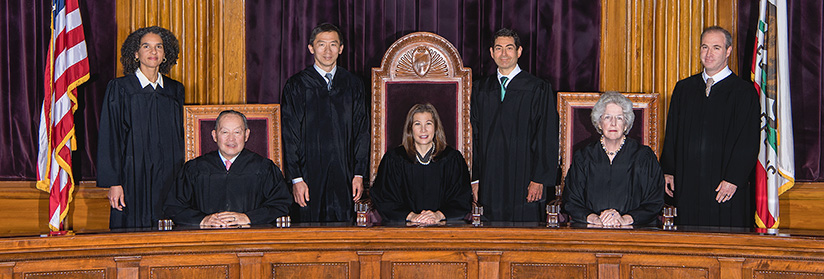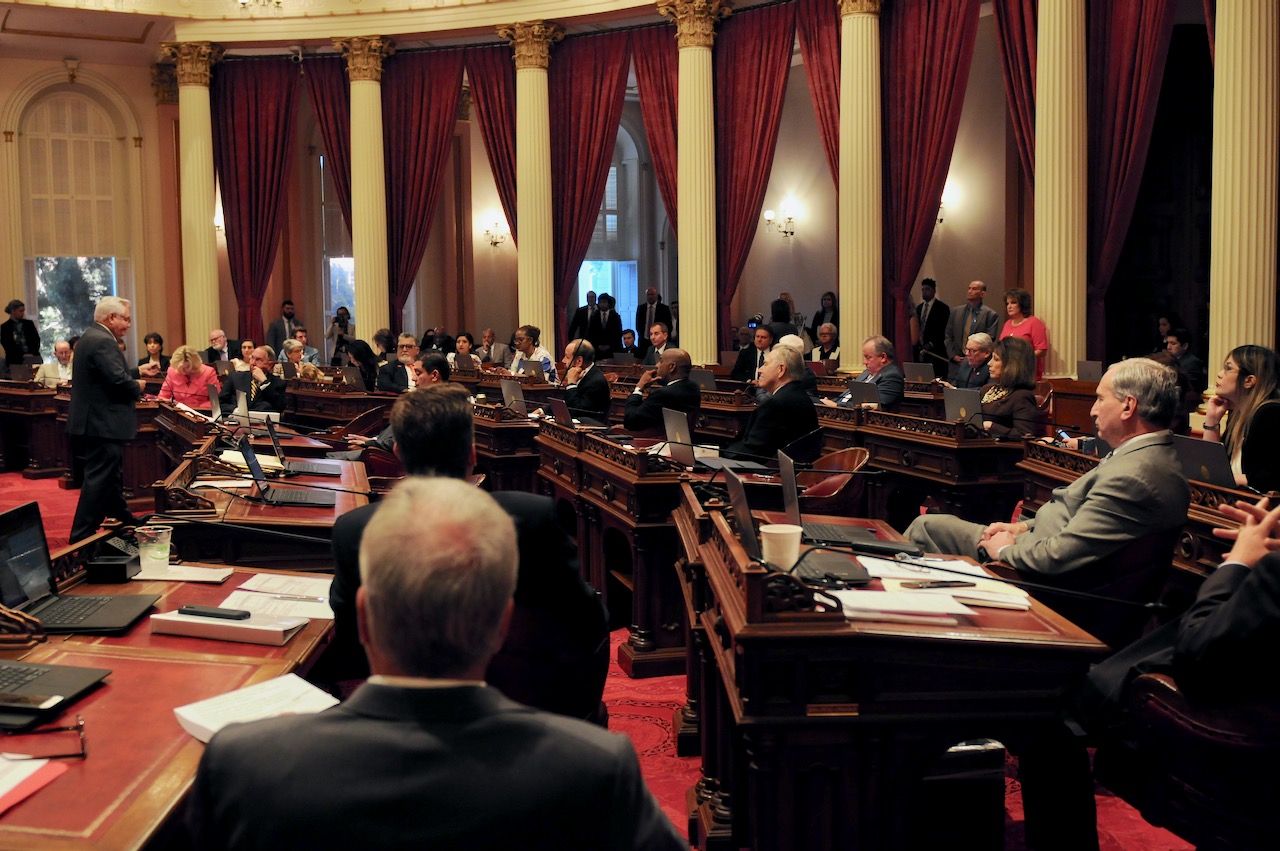
Judge's gavel on courtroom background. Law and justice. (Photo: Zolnierek, Shutterstock)
Court Writs in California
There are three main writs specified in the California Code of Civil Procedure
By Chris Micheli, January 29, 2023 9:06 am
There are three main writs specified in the California Code of Civil Procedure (CCP), which are the writs of review, mandate, and prohibition. These are contained in Title 1 of Part 3 of the CCP. Chapter 1 of Title 1 deals with the writ of review. CCP Section 1067 specifies that the writ of certiorari may be named as the writ of review.
CCP Section 1068 provides that a writ of review may be granted by any court when an inferior tribunal, board, or officer, exercising judicial functions, has exceeded the jurisdiction of the tribunal, board, or officer, and there is no appeal nor, in the judgment of the court, any plain, speedy, and adequate remedy.
CCP Section 1069 requires the application for the writ to be made on a verified petition of the party beneficially interested, and the court may require a notice of the application to be given to the adverse party, or may grant an order to show cause why it should not be allowed, or may grant the writ without notice.
CCP Section 1070 provides that the writ may be directed to the tribunal, Board, or officer, or to any other person having the custody of the record or proceedings to be certified. When directed to a tribunal, the Clerk must return the writ with the transcript required.
CCP Section 1071 requires the writ of review to command the party to whom it is directed to certify fully to the court issuing the writ at a time and place then or thereafter specified by court order a transcript of the record and proceedings, that the information may be reviewed by the court; and requiring the party to cease further proceedings in the matter to be reviewed.
CCP Section 1071 states that, if a stay of proceedings is not intended, the words requiring the stay must be omitted from the writ; these words may be inserted or omitted, in the discretion of the Court.
CCP Section 1073 requires a writ to be served in the same manner as a summons in civil action. CCP Section 1074 provides that the review upon this writ cannot be extended further than to determine whether the tribunal, Board, or officer has regularly pursued the authority of the tribunal, Board, or officer.
CCP Section 1075 provides that, if the return of the writ is defective, the Court may order a further return to be made. When a full return has been made, the Court must hear the parties, and then give judgment, either affirming or annulling, or modifying the proceedings below.
CCP Section 1076 requires a copy of the judgment signed by the Clerk to be transmitted to the tribunal, Board, or officer having the custody of the record or proceeding certified.
Chapter 2 of Title 1 deals with the writ of mandate. CCP Section 1083 specifies that the writ of mandamus may be called a writ of mandate. CCP Section 1085 authorizes a writ of mandate to be issued by any court to any tribunal, corporation, board, or person, to compel the performance of an act which the law specially enjoins, as a duty resulting from an office, trust, or station, or to compel the admission of a party to the use and enjoyment of a right or office to which the party is entitled.
CCP Section 1086 requires the writ to be issued in all cases where there is not a plain, speedy, and adequate remedy, in the ordinary course of law. It must be issued upon the verified petition of the party beneficially interested.
CCP Section 1087 provides that the writ is either alternative or peremptory. The alternative writ must command the party to whom it is directed immediately after the receipt of the writ, or at some other specified time, to do the act required to be performed, or to show cause before the court at a time and place specified by court order why he has not done so. The peremptory writ must be in a similar form, except that the words requiring the party to show cause why he or she has not done as commanded must be omitted.
CCP Section 1088 specifies that, when the application to the court is made without notice to the adverse party, and the writ is allowed, the alternative must be first issued; but, if the application is upon due notice and the writ is allowed, the peremptory writ may be issued in the first instance.
CCP Section 1088.5 states that, in a trial court, if no alternative writ is sought, proof of service of a copy of the petition need not accompany the application for a writ at the time of filing, but proof of service of a copy of the filed petition must be lodged with the court prior to a hearing or any action by the court.
CCP Section 1089.5 specifies that, where a petition for writ of mandate is filed in the trial court, and where a record of the proceedings to be reviewed has been filed with the petition or where no record of a proceeding is required, the respondent is required to respond within 30 days after service of the petition.
CCP Section 1094.5 provides that, where the writ is issued for the purpose of inquiring into the validity of any final administrative order or decision made as the result of a proceeding in which by law a hearing is required to be given, evidence is required to be taken, and discretion in the determination of facts is vested in the inferior tribunal, corporation, board, or officer, the case must be heard by the court sitting without a jury.
CCP Section 1094.6 specifies that judicial review of any decision of a local agency, other than a school district, or of any commission, board, officer or agent thereof, may be held only if the petition for writ of mandate is filed within the time limits specified in this section.
CCP Section 1096 requires the writ to be served in the same manner as a summons in a civil action. Service upon a majority of the members of any Board or body, is service upon the Board or body, whether at the time of the service the Board or body was in session or not.
CCP Section 1097 provides that, if a peremptory mandate has been issued and directed to an inferior tribunal, corporation, board, or person, and it appears to the court that a member of the tribunal, corporation, or board, or the person upon whom the writ has been personally served, has, without just excuse, refused or neglected to obey the writ, the court may, upon motion, impose a fine not exceeding $1,000.
Chapter 3 of Title 1 deals with the writ of prohibition. CCP Section 1102 provides that the writ of prohibition arrests the proceedings of any tribunal, corporation, board, or person exercising judicial functions, when the proceedings are without or in excess of the jurisdiction of the tribunal, corporation, board, or person.
CCP Section 1103 authorizes a writ of prohibition to be issued by any court to an inferior tribunal or to a corporation, board, or person, in all cases where there is not a plain, speedy, and adequate remedy in the ordinary course of law.
CCP Section 1104 requires the writ to be either alternative or peremptory. The alternative writ must command the party to whom it is directed to refrain from further proceedings in the action or matter until the further order of the court from which it is issued, and to show cause before the court at a time and place specified by court order why the party should not be absolutely restrained from any further proceedings in the action or matter.
Chapter 4 of Title 1 of Part 3 deals with writs that may be issued and be heard at Chambers. CCP Section 1107 provides that, when an application is filed for the issuance of any prerogative writ, the application must be accompanied by proof of service of a copy upon the respondent and the real party in interest named in the application.
CCP Section 1108 provides that writs of review, mandate, and prohibition issued by the Supreme Court, a court of appeal, or a superior court, may, in the discretion of the court issuing the writ, be made returnable, and a hearing be held at any time.
- Lis Pendens in California - February 14, 2026
- Scope of International Commercial Arbitration - February 14, 2026
- Eminent Domain Law - February 13, 2026




Always good stuff, Mr. Micheli. Thank you.